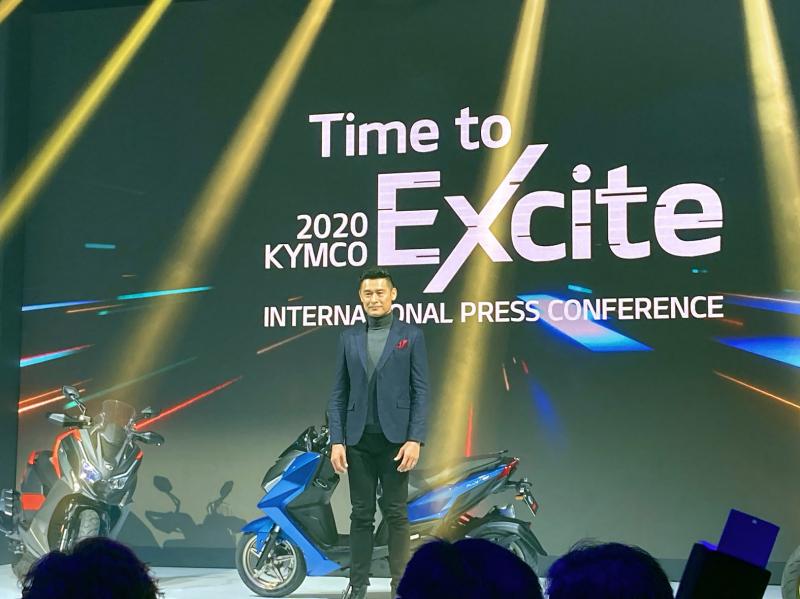Kwang Yang Motor Co (光陽工業), which sells its products under the brandname KYMCO, yesterday unveiled a new electric sport scooter, dubbed F9, to target eco-conscious riders.
The F9 is the first electric scooter designed by the company from scratch, it said.
The nation’s biggest manufacturer of gas-powered scooters, Kwang Yang ventured into electric scooters about three years ago by remaking its gas-powered “Many” and “Nice” series into electric ones. At the time, the focus was mostly on its battery charging system, called Ionex.

Photo: Lisa Wang, Taipei Times
“KYMCO’s all-new F9 model offers not only urban mobility, but also satisfies riders’ desire for a better steering experience,” company chairman Allen Ko (柯勝峰) told a global conference in Taipei.
The one-seat electric scooter performs better than a 150cc scooter, the company said, adding that most electric scooters sold on the local market are 125cc models, including those from Gogoro Inc (睿能創意).
The F9 is scheduled to hit the market next year, the company said.
Another electric motorcycle model, called RevoNEX, is to enter mass production at a factory in Italy, it added. Kwang Yang unveiled the concept vehicle at the Milan Motorcycle Show last year, targeting the global electric motorcycle market.
Aside from those two high-performance electric two-wheelers, Kwang Yang CEO Ko Chun-ping (柯俊斌) said the company is to roll out new electric scooters for the mainstream market in the near future.
The company also unveiled two new gas-powered motorcycles and one gas-powered scooter.
Thanks to tax incentives and purchase subsidies, Kwang Yang expects the domestic scooter market to rise 12.2 percent year-on-year to hit a 25-year high of 1.01 million units this year.
The COVID-19 outbreak has also stimulated demand, as people try to avoid mass transportation to reduce risks of contracting the virus, the company said.
“Government tax incentives and subsidies are the biggest drivers behind the growth,” Ko said. “Our shipments are capped by limited capacity. This year’s growth has greatly exceeded our expectations.”
As the Environmental Protection Administration is to stop subsidies for gas-powered scooters that meet its Phase 7 emissions standards from January, Ko said that scooter sales are expected to shrink by between 5 and 10 percent to between 900,000 and 950,000 units next year.
Kwang Yang expects its market share to climb to 34 percent this year from last year’s 33.4 percent, with total sales reaching 350,000 units.
Separately, Gogoro yesterday announced that China Motor Corp (中華汽車) is to join the “Powered by Gogoro Network,” making it the fifth member of the network.
Starting next year, China Motor is to offer new electric scooters under the company’s “eMoving” series that are equipped with batteries that riders can either recharge or swap for new ones.

GROWING OWINGS: While Luxembourg and China swapped the top three spots, the US continued to be the largest exposure for Taiwan for the 41st consecutive quarter The US remained the largest debtor nation to Taiwan’s banking sector for the 41st consecutive quarter at the end of September, after local banks’ exposure to the US market rose more than 2 percent from three months earlier, the central bank said. Exposure to the US increased to US$198.896 billion, up US$4.026 billion, or 2.07 percent, from US$194.87 billion in the previous quarter, data released by the central bank showed on Friday. Of the increase, about US$1.4 billion came from banks’ investments in securitized products and interbank loans in the US, while another US$2.6 billion stemmed from trust assets, including mutual funds,

AI TALENT: No financial details were released about the deal, in which top Groq executives, including its CEO, would join Nvidia to help advance the technology Nvidia Corp has agreed to a licensing deal with artificial intelligence (AI) start-up Groq, furthering its investments in companies connected to the AI boom and gaining the right to add a new type of technology to its products. The world’s largest publicly traded company has paid for the right to use Groq’s technology and is to integrate its chip design into future products. Some of the start-up’s executives are leaving to join Nvidia to help with that effort, the companies said. Groq would continue as an independent company with a new chief executive, it said on Wednesday in a post on its Web

JOINT EFFORTS: MediaTek would partner with Denso to develop custom chips to support the car-part specialist company’s driver-assist systems in an expanding market MediaTek Inc (聯發科), the world’s largest mobile phone chip designer, yesterday said it is working closely with Japan’s Denso Corp to build a custom automotive system-on-chip (SoC) solution tailored for advanced driver-assistance systems and cockpit systems, adding another customer to its new application-specific IC (ASIC) business. This effort merges Denso’s automotive-grade safety expertise and deep vehicle integration with MediaTek’s technologies cultivated through the development of Media- Tek’s Dimensity AX, leveraging efficient, high-performance SoCs and artificial intelligence (AI) capabilities to offer a scalable, production-ready platform for next-generation driver assistance, the company said in a statement yesterday. “Through this collaboration, we are bringing two

Even as the US is embarked on a bitter rivalry with China over the deployment of artificial intelligence (AI), Chinese technology is quietly making inroads into the US market. Despite considerable geopolitical tensions, Chinese open-source AI models are winning over a growing number of programmers and companies in the US. These are different from the closed generative AI models that have become household names — ChatGPT-maker OpenAI or Google’s Gemini — whose inner workings are fiercely protected. In contrast, “open” models offered by many Chinese rivals, from Alibaba (阿里巴巴) to DeepSeek (深度求索), allow programmers to customize parts of the software to suit their